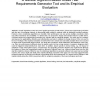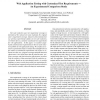TSE
2010
13 years 4 months ago
2010
Genetic algorithms (GAs) have been applied previously to UML-driven, stress test requirements generation with the aim of increasing chances of discovering faults relating to networ...
JSS
2008
13 years 7 months ago
2008
This report presents a model-driven, stress test methodology aimed at increasing chances of discovering faults related to network traffic in Distributed Real-Time Systems (DRTS). T...
DELTA
2010
IEEE
13 years 8 months ago
2010
IEEE
This paper presents an overview of test techniques that offer promising features when Built-In-Self-Test (BIST) must be applied to complex intgrated systems including analog, mixed...
UML
2001
Springer
14 years 1 months ago
2001
Springer
System testing is concerned with testing an entire system based on its specifications. In the context of object-oriented, UML development, this means that system test requirements ...
ISSTA
2006
ACM
14 years 3 months ago
2006
ACM
Existing test suite reduction techniques employed for testing web applications have either used traditional program coverage-based requirements or usage-based requirements. In thi...
ISSRE
2006
IEEE
14 years 3 months ago
2006
IEEE
Test suite reduction uses test requirement coverage to determine if the reduced test suite maintains the original suite’s requirement coverage. Based on observations from our pr...


